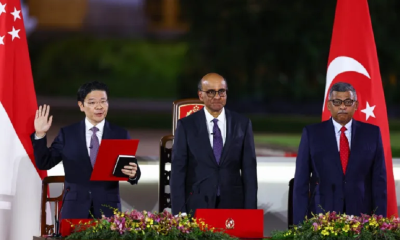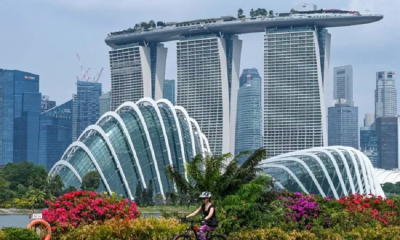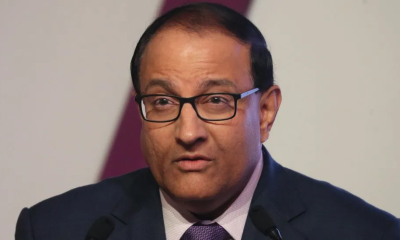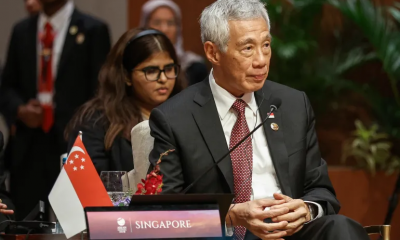Foreign News
Singapore tightens rules for expat workers with an eye on local discontent

Singapore – One of the world’s most open economies is attempting a delicate balancing act.
On the one hand, the Southeast Asian city-state wants to lure the world’s best and brightest to bolster its workforce, one of Asia’s most diverse. On the other hand, it has to assure locals competing with foreigners for jobs that the system works for them, too, nipping potential resentment or xenophobia in the bud.
From next year, the government will tweak that calculus in favour of locals by raising the salary threshold for foreigners seeking approval to work in the city-state.
Last month, Singapore’s Ministry of Manpower announced that new applicants for the Employment Pass (EP) system will have to earn at least 5,600 Singapore dollars ($4,140) per month, up from 5,000 Singapore dollars ($3,700).
Applicants working in the financial services sector will have to earn at least 6,200 Singapore dollars ($4,600), compared with 5,500 Singapore dollars ($4,100) at present.
“By regularly updating the qualifying salaries based on the set wage benchmarks, we ensure a level-playing field for locals,” Manpower Minister Tan See Leng told parliament during a budget debate.
Analysts said the changes were not surprising for a government that has regularly tweaked the rules for expat workers, most recently in September 2022, when it raised the salary threshold by 500 Singapore dollars ($370).
Walter Theseira, an associate professor and labour economist at the Singapore University for Social Sciences (SUSS), said the move had been “telegraphed for a number of years”.
Theseira said that while the EP system was originally intended to import highly-skilled workers to fill gaps in the workforce, “the criteria seemed to have expanded and EP holders became more prevalent in the middle of the market as well”.
“This was perceived by local workers to be unwelcome competition for jobs that many skilled locals could do, so the government responded by re-calibrating the EP again upwards, so that based on salaries, it now targets more clearly the high-end,” he said.
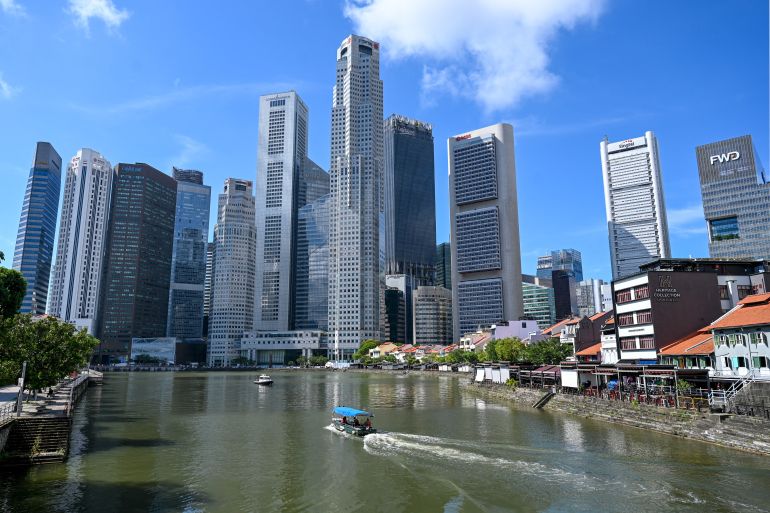
Singapore has built its reputation on attracting foreign talent (Aljazeera)
For decades, Singapore, an island with no natural resources that is about the size of New York City, has built its reputation on an openness to foreign talent.
The number of EP holders has grown substantially over the years, fuelled in part by anxiety over the country’s rock-bottom birthrate and greying population.
As of December last year, there were about 205,400 EP holders in the city, up from 161,700 during the same month in 2021.
As far back as 2021, Tan acknowledged that Singaporeans, though recognising the need to attract foreign talent, had concerns that the influx came at the “expense” of local businesses.
A labour market report released by the Manpower Ministry last month showed that employment growth in 2023, comprising 88,400 positions in Singapore – excluding migrant domestic workers – was largely made up of foreigners.
The revision of the EP qualification criteria can be seen as “a strategic move” to appease age-old tensions over hiring foreign talent amid a crowded job market, said Joshua Yim, the CEO of Achieve Group, a talent acquisition consultancy.
The changes also come as the Southeast Asian country is gearing up for one of the most politically significant transitions in its history.
Singapore’s ruling People’s Action Party is set to fight the next general election, due by 2025, under new leadership as incumbent Prime Minister Lee Hsien Loong prepares to step down after some two decades in office.
The issue of foreign workers became salient in the 2011 general election, when public discontent simmered over rising competition for jobs and increasing pressure on public infrastructure.
While most Singaporeans and permanent residents agree that immigration is generally good for the economy, slightly more than half also believe that immigrants take jobs away from locals, according to a 2021 survey by the Institute of Policy Studies.
In another survey conducted by the research firm Milieu Insight, Singaporeans were almost evenly divided on whether the nation struck the right balance between bringing in foreign workers and protecting local jobs.
Sid Suhas, the senior vice president and head of EMEA & APAC at the talent acquisition firm Cielo, said the visa changes are likely to prompt large employers to “focus more on attracting, developing and nurturing the local talent pool, particularly for junior professional and mid-level lower-skilled roles.”
With the higher salary threshold, companies are likely to adopt “a skills-first approach” when employing foreigners, Suhas said, focusing on talent in areas such as AI, technology, engineering and healthcare.
“The trend of limiting foreign talent deployment to specific skills and industries is inevitable. In the past, foreign talent had the opportunity to develop their careers in Singapore across various roles but now, the focus will likely be on senior and niche positions,” Suhas told Al Jazeera.
Suhas said he has already seen companies exploring alternative locations in the Association of Southeast Asian Nations (ASEAN) such as Thailand, Malaysia and Indonesia, as a means of relocating key talent while still maintaining proximity to Singapore.
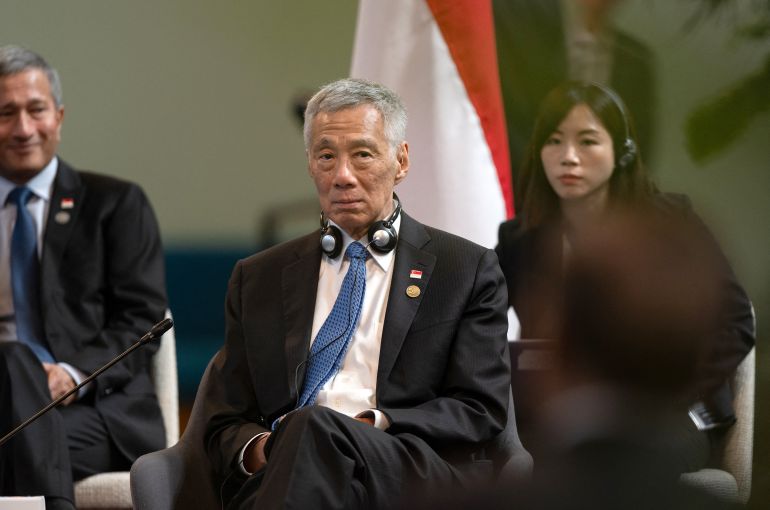
Singapore’s Prime Minister Lee Hsien Loong is due to step down before the 2025 general elections (Aljazeera)
“Most SMEs [small to medium-sized enterprises] do not rely much on EP workforce as their core talent pool,” Yuit told Al Jazeera.
“Selected businesses may have EP hiring in the stated 5,000 or 5,500 [Singapore dollars] range for specialised roles but usually, that is for time-limited, project engagement or if they are in specialised sectors that rely on a foreign talent pool because of a lack of matching local workforce.”
But the increased labour costs could affect the profitability of SMEs with tighter budget constraints, said Achieve Group’s Yim.
“Local SMEs may not be so well-oiled in terms of their processes and operations, as compared to the MNCs,” Yim said.
“They will feel the heat because they have to go up against the big players with the financial muscles who can offer higher EP salaries and attract better-quality talent. They might feel that talent is being stolen away and thus, this group is at the shorter end of the stick.”
Xu Le, a lecturer from the department of strategy and policy at the National University of Singapore’s Business School, said the policy change could “spur local companies to think out of the box and explore alternative methods to enhance overall operational efficiency and labour productivity”, in turn benefitting the economy.
Beatrice Liu-Cheng, the CEO of Oriental Remedies Group, said that while the higher-qualification threshold could pose challenges for her chain of Chinese medicine clinics, it would also be an “opportunity to further enhance the diversity and expertise” within its workforce.
Liu-Cheng said the changes would encourage her to seek out and nurture Singaporean talent through training programmes, mentorship initiatives and partnerships with educational institutions.
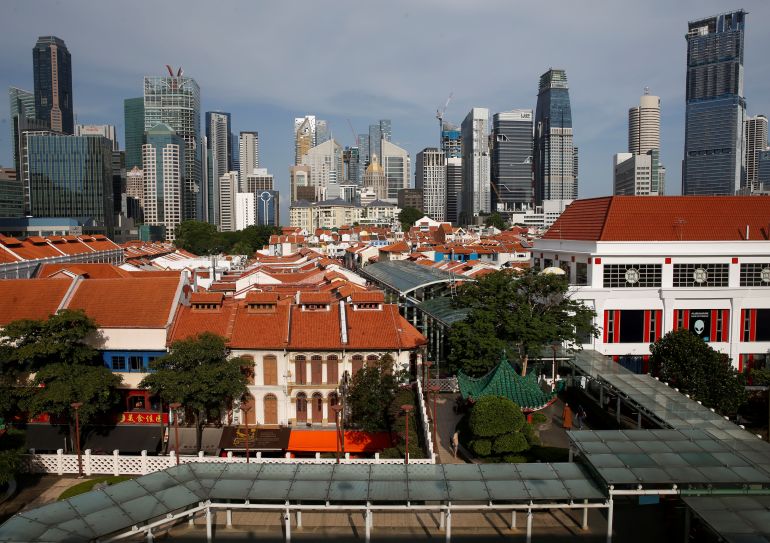 Singapore is known for its business-friendly environment (Aljazeera)
Singapore is known for its business-friendly environment (Aljazeera)
While the migration changes are set to raise the cost of doing business, Singapore’s advantages, including a business-friendly environment, its strategic location and world-class infrastructure, will continue to attract international companies, analysts said.
Singapore is expected to remain “the preferred choice” for firms’ regional headquarters, said Cielo’s Suhas, even if deploying smaller teams becomes more common due to the higher costs.
Suhas said the changes would also accelerate the various government initiatives aimed at creating high-quality jobs for locals, including early talent programmes and re-skilling programmes for mid-to-late career professionals.
“As a result, we anticipate that global companies setting up in Singapore will increasingly prioritise hiring Singaporeans,” he said.
Singapore ranks second in the 2023 World Economic Forum’s Global Talent Competitiveness Index, behind Switzerland.
Nicholas Sim, an associate professor at SUSS’s business school, said that businesses seeking to establish a foothold in Asia are still likely to prioritise Singapore due to its “high-quality infrastructure, efficient and stable government and access to a high-calibre talent pool”.
Besides the EP scheme, there are other avenues for foreign talent to come to Singapore.
In 2023, the Manpower Ministry launched the Overseas Networks & Expertise Pass for “top talent” in business, arts and culture, sports, academia and research.
As of January, the ministry had approved nearly 4,200 applications for the pass.
“Going forward, it’s a clear sign that the Singapore government wants to bring high-calibre individuals into the Singapore workforce – and firms will need to deliberate more carefully about hiring top-tier foreign candidates who are skilled and can add to Singapore’s long-term competitiveness,” Yim said.
”All the more, MNCs will see Singapore as a place for the cream of the crop.”
(Aljazeera)
Foreign News
King Charles to host Nigeria’s first UK state visit in 37 years
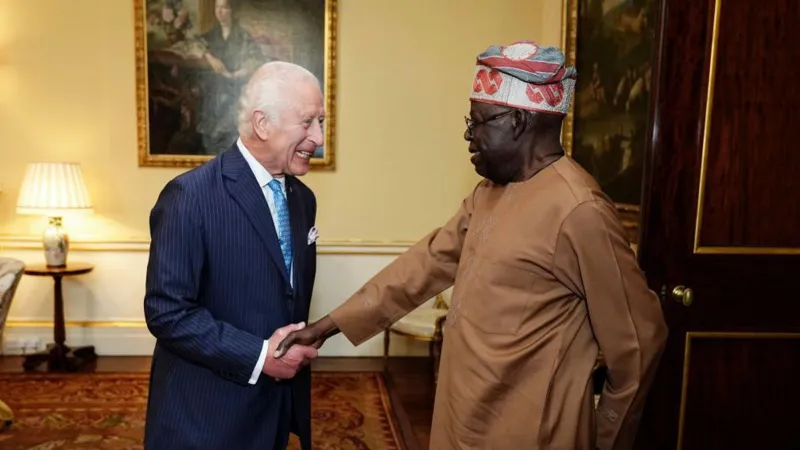
King Charles III and Queen Camilla will host Nigeria’s president in the country’s first state visit to the UK in 37 years, Buckingham Palace has announced.
Bola Tinubu and First Lady Oluremi Tinubu have accepted an invitation to be guests of the King at Windsor Castle from 18 to 19 March.
State visits are considered a form of soft-power diplomacy, using the pomp of royal hospitality to strengthen relations with important international partners.
The last Nigerian state visit to the UK took place in 1989, when military ruler Gen Ibrahim Babangida travelled to meet the late Queen Elizabeth II for a four-day trip.
Although this will be Tinubu’s first formal state visit to the UK, he has already met the King since taking office following Nigeria’s disputed election in 2023.
Tinubu and his wife were received at Buckingham Palace in September 2024 and also held a bilateral meeting with the King on the sidelines of the COP28 summit in Dubai.
But a state visit allows for ceremonial pageantry aimed at elevating the occasion and demonstrating the importance with which the UK views those visiting.
The visit comes at a time of improving diplomatic and economic links between the UK and Nigeria – with trade between the two worth more than £8bn in the year to October, government figures show. This makes the African nation one of the UK’s most important partners in the continent.
In 2024, the two countries signed a new trade and investment partnership designed to expand opportunities for business.
The agenda for the March visit has not been disclosed, nor details of the events planned for it – but state visits typically include carriage processions and a state banquet, and usually coincide with visiting leaders having political meetings.

In 2025 alone, the King presided over three state visits – those of French President Emmanuel Macron, US President Donald Trump and German President Frank-Walter Steinmeier – the first time the UK had held such a number in a single year since 1988.
The King has longstanding ties to Nigeria, a Commonwealth country, having expressed a love for Pidgin English and Nigerian Afrobeats music.
Before becoming monarch, he visited the country four times as the Prince of Wales – in 1990, 1999, 2006 and 2018. Camilla, then the Duchess of Cornwall, joined him on the latter trip.
In 2023, the King’s Trust International – formerly the Prince’s Trust – officially launched in Nigeria, announcing a project aimed at tackling youth unemployment.
[BBC]
Foreign News
Colorado funeral home director sentenced to 40 years for corpse abuse

The co-owner of a Colorado funeral home where nearly 200 decaying bodies were found has been sentenced to 40 years in prison for corpse abuse.
Before Jon Hallford was sentenced, he apologised in court and listened to family members describe having nightmares about their loved ones decomposing in his care. They called him a “monster” who should rot in jail.
His ex-wife and co-owner Carie Hallford has pleaded guilty to similar charges and is awaiting sentencing.
The Return to Nature home, in the town of Penrose, Colorado, had given fake ashes to grieving relatives instead of their loved-ones’ remains. Prosecutors said 189 bodies were improperly stored in the building over four years.
Foreign News
Louvre Museum crown left crushed but ‘intact’ after raid

The crown of French Empress Eugenie was left crushed after being dropped by fleeing thieves during the raid at the Louvre last October – but is “nearly intact” and can be fully restored, the museum has said.
Raiders stole an estimated 88 million euros (£76m, $104m) in jewels, but left the diamond-studded headpiece belonging to the wife of Napoleon III on their escape route.
The museum has issued the first photographs of the crown since the theft, saying it had been left “badly deformed” after the thieves tried to remove it through a narrow hole they sawed in its glass display case.
The crown is missing one of eight golden eagles that adorned it but retains its 56 emeralds and all but 10 of its 1,354 diamonds.

It added the 19th Century crown would be restored to its original state “without the need for reconstruction”.
An expert committee led by the museum’s president Laurence des Cars had been selected to supervise the restoration.
The heist took place on 19 October and saw the gang use a stolen vehicle-mounted mechanical lift to gain access to the Galerie d’Apollon (Gallery of Apollo) via a balcony close to the River Seine.

Two of the thieves got inside by cutting through the window with power tools. They then threatened the guards, who evacuated the area, and cut through the glass of two display cases housing jewellery that once belonged to French royalty or its imperial rulers.
Prosecutors said the thieves were inside for less than four minutes before making their escape on two scooters waiting outside.
Police have arrested four male suspects who prosecutors allege are the thieves – but the mastermind behind the raid has not been tracked down.
The seven other items of jewellery taken, including a diamond-studded tiara that belonged to Eugenie and necklaces, ear-rings and brooches remain missing.

[BBC]
-

 Business1 day ago
Business1 day agoZone24x7 enters 2026 with strong momentum, reinforcing its role as an enterprise AI and automation partner
-

 Business5 days ago
Business5 days agoSLIM-Kantar People’s Awards 2026 to recognise Sri Lanka’s most trusted brands and personalities
-

 Business6 days ago
Business6 days agoAll set for Global Synergy Awards 2026 at Waters Edge
-

 Business1 day ago
Business1 day agoHNB recognized among Top 10 Best Employers of 2025 at the EFC National Best Employer Awards
-

 Business5 days ago
Business5 days agoAPI-first card issuing and processing platform for Pan Asia Bank
-

 Editorial3 days ago
Editorial3 days agoAll’s not well that ends well?
-

 Business1 day ago
Business1 day agoGREAT 2025–2030: Sri Lanka’s Green ambition meets a grid reality check
-

 Features3 days ago
Features3 days agoPhew! The heat …




